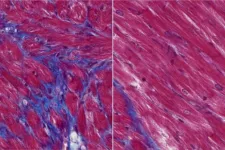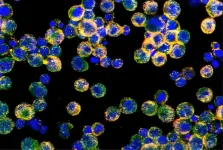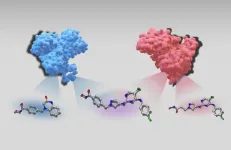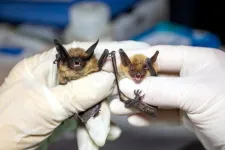(Press-News.org) About The Study: In this cohort study, distinct forms of traumatic and adverse childhood experiences differentially moderated developmental changes in psychiatric risk and cognitive ability in different ways, offering the possibility for precision-based prediction of risk for youth. Such findings could be used in targeted early prevention and intervention strategies for at-risk youth.
Corresponding Author: To contact the corresponding author, Justin D. Russell, PhD, email jdrussell3@wisc.edu
To access the embargoed study: Visit our For The Media website at this link https://media.jamanetwork.com/
(10.1001/jamapsychiatry.2024.3231)
Editor’s Note: Please see the article for additional information, including other authors, author contributions and affiliations, conflict of interest and financial disclosures, and funding and support.
# # #
Embed this link to provide your readers free access to the full-text article This link will be live at the embargo time https://jamanetwork.com/journals/jamapsychiatry/fullarticle/10.1001/jamapsychiatry.2024.3231?guestAccessKey=f6802585-2f18-42ae-8ffd-df385e068fce&utm_source=for_the_media&utm_medium=referral&utm_campaign=ftm_links&utm_content=tfl&utm_term=102324
END
Traumatic and adverse childhood experiences and developmental differences in psychiatric risk
JAMA Psychiatry
2024-10-23
ELSE PRESS RELEASES FROM THIS DATE:
Immunotherapy blocks scarring, improves heart function in mice with heart failure
2024-10-23
A new study from Washington University School of Medicine in St. Louis suggests that a type of immunotherapy — similar to that approved by the Food and Drug Administration (FDA) to treat inflammatory conditions such as arthritis — also may be an effective treatment strategy for heart failure.
The study is published Oct. 23 in the journal Nature.
After a heart attack, viral infection or other injury to the heart, scar tissue often forms in the heart muscle, where it interferes with the heart’s normal contractions and plays a leading role in heart failure, the progressive loss of the heart’s ...
Discovery finds how ovarian cancer disables immune cells
2024-10-23
Weill Cornell Medicine researchers have discovered a mechanism that ovarian tumors use to cripple immune cells and impede their attack—blocking the energy supply T cells depend on. The work, published Oct. 23 in Nature, points toward a promising new immunotherapy approach for ovarian cancer, which is notoriously aggressive and hard to treat.
A significant obstacle in treating ovarian cancer is the tumor microenvironment—the complex ecosystem of cells, molecules and blood vessels that shields cancer cells from the immune system. Within this hostile environment, T cells lose their ability to take up the lipid (fat) molecules, which are necessary for energy to mount ...
Physicists discover first “black hole triple”
2024-10-23
Many black holes detected to date appear to be part of a pair. These binary systems comprise a black hole and a secondary object — such as a star, a much denser neutron star, or another black hole — that spiral around each other, drawn together by the black hole’s gravity to form a tight orbital pair.
Now a surprising discovery is expanding the picture of black holes, the objects they can host, and the way they form.
In a study appearing in Nature, physicists at MIT and Caltech report that they have observed a “black hole triple” for the first time. The new system holds a central black hole in the act of consuming a small star ...
A “chemical ChatGPT” for new medications
2024-10-23
Researchers from the University of Bonn have trained an AI process to predict potential active ingredients with special properties. Therefore, they derived a chemical language model – a kind of ChatGPT for molecules. Following a training phase, the AI was able to exactly reproduce the chemical structures of compounds with known dual-target activity that may be particularly effective medications. The study has now been published in Cell Reports Physical Science. Do not publish before Wednesday, October 23rd, 5:00 pm CEST!
Anyone ...
Soteria Precision Medicine Foundation partners with Translational Genomics Research Institute (TGen) to inform cancer care for Special Operations Forces
2024-10-23
PHOENIX, AZ (Oct. 23, 2024) — Soteria Precision Medicine Foundation, a non-profit organization dedicated to providing leading-edge patient precision medicine navigation services to individuals with cancer diagnoses, today announced a partnership with the Translational Genomics Research Institute (TGen), part of City of Hope, to provide precision medicine navigation for Special Operation Forces in their battle against cancer.
Through the strategic agreement with TGen, Soteria will deploy, and scale precision medicine navigation capabilities tailored to meet the unique needs of Special Operation Forces (SOF) members ...
Capturing carbon from the air just got easier
2024-10-23
Capturing and storing the carbon dioxide humans produce is key to lowering atmospheric greenhouse gases and slowing global warming, but today's carbon capture technologies work well only for concentrated sources of carbon, such as power plant exhaust. The same methods cannot efficiently capture carbon dioxide from ambient air, where concentrations are hundreds of times lower than in flue gases.
Yet direct air capture, or DAC, is being counted on to reverse the rise of CO2 levels, which have reached 426 parts per million (ppm), 50% higher than ...
Ultra-small spectrometer yields the power of a 1,000 times bigger device
2024-10-23
Spectrometers are technology for reading light that date back to the era of famed 17th-century physicist Isaac Newton. They work by breaking down light waves into their different colors — or spectra — to provide information about the makeup of the objects being measured.
UC Santa Cruz researchers are designing new ways to make spectrometers that are ultra-small but still very powerful, to be used for anything from detecting disease to observing stars in distant galaxies. Their inexpensive production cost makes them more accessible and customizable for specific applications.
The team of researchers, led by an interdisciplinary ...
Rocky planets orbiting small stars could have stable atmospheres needed to support life
2024-10-23
Since its launch in late 2021, NASA’s James Webb Space Telescope has raised the possibility that we could detect signs of life on exoplanets, or planets outside our solar system.
Top candidates in this search are rocky, rather than gaseous, planets orbiting low-mass stars called M-dwarfs — easily the most common stars in the universe. One nearby M-dwarf is TRAPPIST-1, a star about 40 light years away that hosts a system of orbiting planets under intense scrutiny in the search for life on planets orbiting stars other than the sun.
Previous research questioned the habitability of planets orbiting TRAPPIST-1, finding that intense UV rays would burn away their ...
A 'worrying confluence' of flood risk, social vulnerability and climate change denial
2024-10-23
In certain parts of the United States, especially Appalachia, New England and the Northwest, the ability of residents to prepare for and respond to flooding is being undercut on three different levels.
This is according to a new study from the University of Michigan's School for Environment and Sustainability.
"It's a very worrying confluence that does keep me up," said Joshua Newell, a professor with the school's Center for Sustainable Systems and senior author of the study. "The communities that are most at risk of catastrophic flooding ...
Saving the bats: Researchers find bacteria, fungi on bat wings that could help fight deadly white-nose syndrome
2024-10-23
Saving the bats: Researchers find bacteria, fungi on bat wings that could help fight deadly white-nose syndrome
Hamilton, ON, Oct. 23, 2024 – Bacteria and fungi from the wings of bats could play a significant role in saving them from white-nose syndrome (WNS), a fungal disease affecting the skin of wings and muzzle, which has nearly wiped out vulnerable bat populations across North America.
Researchers at McMaster University have gathered and analyzed samples from the community of microorganisms, or microbiome, on the wings of several bat species ...
LAST 30 PRESS RELEASES:
Bacteria frozen in ancient underground ice cave found to be resistant against 10 modern antibiotics
Rhododendron-derived drugs now made by bacteria
Admissions for child maltreatment decreased during first phase of COVID-19 pandemic, but ICU admissions increased later
Power in motion: transforming energy harvesting with gyroscopes
Ketamine high NOT related to treatment success for people with alcohol problems, study finds
1 in 6 Medicare beneficiaries depend on telehealth for key medical care
Maps can encourage home radon testing in the right settings
Exploring the link between hearing loss and cognitive decline
Machine learning tool can predict serious transplant complications months earlier
Prevalence of over-the-counter and prescription medication use in the US
US child mental health care need, unmet needs, and difficulty accessing services
Incidental rotator cuff abnormalities on magnetic resonance imaging
Sensing local fibers in pancreatic tumors, cancer cells ‘choose’ to either grow or tolerate treatment
Barriers to mental health care leave many children behind, new data cautions
Cancer and inflammation: immunologic interplay, translational advances, and clinical strategies
Bioactive polyphenolic compounds and in vitro anti-degenerative property-based pharmacological propensities of some promising germplasms of Amaranthus hypochondriacus L.
AI-powered companionship: PolyU interfaculty scholar harnesses music and empathetic speech in robots to combat loneliness
Antarctica sits above Earth’s strongest “gravity hole.” Now we know how it got that way
Haircare products made with botanicals protects strands, adds shine
Enhanced pulmonary nodule detection and classification using artificial intelligence on LIDC-IDRI data
Using NBA, study finds that pay differences among top performers can erode cooperation
Korea University, Stanford University, and IESGA launch Water Sustainability Index to combat ESG greenwashing
Molecular glue discovery: large scale instead of lucky strike
Insulin resistance predictor highlights cancer connection
Explaining next-generation solar cells
Slippery ions create a smoother path to blue energy
Magnetic resonance imaging opens the door to better treatments for underdiagnosed atypical Parkinsonisms
National poll finds gaps in community preparedness for teen cardiac emergencies
One strategy to block both drug-resistant bacteria and influenza: new broad-spectrum infection prevention approach validated
Survey: 3 in 4 skip physical therapy homework, stunting progress
[Press-News.org] Traumatic and adverse childhood experiences and developmental differences in psychiatric riskJAMA Psychiatry








